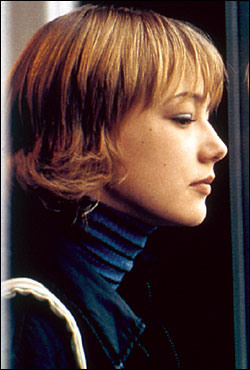In her knowing debut comedy, Slums of Beverly Hills, writer-director Tamara Jenkins cheerfully lays waste to two clich鳺 the glamour of Beverly Hills and coming of age (female style).
Slums of Beverly Hills
directed by Tamara Jenkins
starring Natasha Lyonne, Alan Arkin, Marisa Tomei
starts Friday, theater TBA
Take Jenkins’ word for it: Within its city limits, Beverly Hills has pockets of tackiness that would do Lynnwood proud. And suddenly becoming owner/manager of a body that’s getting every kind of attention is not fun.
“You don’t get an operator’s manual with this [new] equipment,” she said, perching intently on the edge of her downtown hotel chair. “And suddenly it’s the focus of everyone’s attention. Your aunt gets to say, ‘My, you’ve filled out,’ right there in the dining room.” Brothers especially have no end of observations, and Jenkins had three. (She’s pruned them back to two in her film.)
“It’s not the male experience at all,” Jenkins says. “When they go down the street, nobody’s yellin’, ‘Nice balls! Hey, you got a great pair there!'” There’s a definite chortle as she warms to the idea, “Maybe someone should.”
The Jenkins chortle is only part of the live experience. She guffaws, pantomimes, semaphores, and conducts an interview, with flair and gusto and enveloping warmth. Actually, after watching Slums, meeting Jenkins isn’t exactly a surprise. It’s not hard to see traces of the Tamara-to-be in the wary, diffident 15-year-old Vivian Abramowitz, particularly as she’s played by Natasha Lyonne. You simply wait for Vivian’s misery to end and Tamara’s joie de vivre to kick in; all the elements are already in place.
If Slums of Beverly Hills is definitely the dark side of “filling out,” it’s also a low-rent view of the city, circa 1957. Far from the madding crowd, or any crowd except pissed-off landlords, this Beverly Hills was—and still is—unrelieved rows of plywood and stucco “dingbats,” to use the proper architectese. Turquoise or flamingo, they sport tony names and sunburst lighting effects on the outside, shag rugs and mirrored closet doors inside. The overall effect is not cheery.
It was the 1950s when Manny Jenkins picked up where his wife had abruptly left off, as sole parent of Tamara and her two brothers, one older, one younger than she. Alan Arkin’s Manny, unflinchingly matter-of-fact in the face of certain disaster, is the bedrock of the movie.
“Back in Philadelphia, my dad had a restaurant he kept reinventing over and over,” Jenkins recalled. But by the time of their nomadic life in Beverly Hills, the restaurant had foundered, and Manny Jenkins was selling big American Fords that nobody wanted. When paychecks at Walker Buerge Ford got thin, the kids got adept at unscheduled post-midnight departures from their plywood palaces. A very real affection for Manuel Jenkins, who died last year at the age of 88, seeps through his daughter’s film. Did she feel it at the time?
“I think so, but I doubt that we ever thought, ‘Gee, isn’t it great that Dad’s taking care of us.’ I was probably grumpier about it as a kid.”
Her father’s attention to the most miniscule details of her life may have had a little to do with his daughter’s grumpiness. For half the audience, Slums‘ purest moment of nostalgia comes with Vivian’s first brassiere, an exercise her father carries out with all the urgency of an atomic duck-and-cover drill.
While Vivian’s eyes roll heavenward, she’s instructed in the lift-and-drop of proper bra fitting by a magnificently experienced corsetiere, “one of those women who seem to have been living in the May Company corset department for 30 years,” Jenkins says fondly. It’s not a private moment. It’s overseen—as always—by Vivian’s granite-faced father, making sure absolutely everything is in its proper place.
As a counterpoint to Vivian’s life, no shred of which has privacy, dignity, or mystery, Jenkins gives us Rita (Marisa Tomei), the Abramowitzs’ wild cousin, just out of drug rehab. “Rita’s a weird hybrid, a sort of anti-role-model role model,” Jenkins explains. “She represents all the things young girls don’t have, especially girls in 1957: personal lives, history, a grown-up, troubled private life. They were ‘older’ women, and you became their psychic valets; you began to take care of them, even though they were the adults.”
Watching the hilarious, delicate, effortless interplay between Tomei and Lyonne makes clear how much of the film falls on Lyonne’s shoulders.
Bizarrely, in her first movie she’d been so good an actress that Jenkins almost wouldn’t interview her. As Woody Allen’s daughter in Everybody Says I Love You, she played the kind of Upper East Side girl you itch to toss into the East River. Jenkins hated her. “I wasn’t honoring her talent,” Jenkins admits. “She’s not that at all; really, she’s like a weed, loose and out-of-control and wild.
“We auditioned a bunch of girls; they were actressy, finished people, polished, manicured, shellacked, fixed. Natasha carried the sense of being unfinished, with a faint touch of gawkiness and a real sense of humor about herself.”
Not a bad alter ego for the Jenkins-to-be: quicksilver talent with a faint overlay of insecurity. Nothing Slums of Beverly Hills doesn’t explain.







